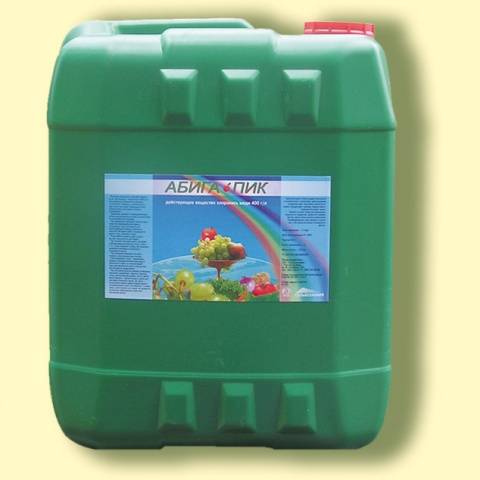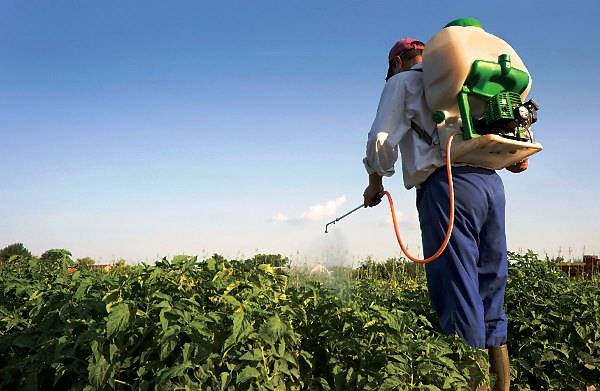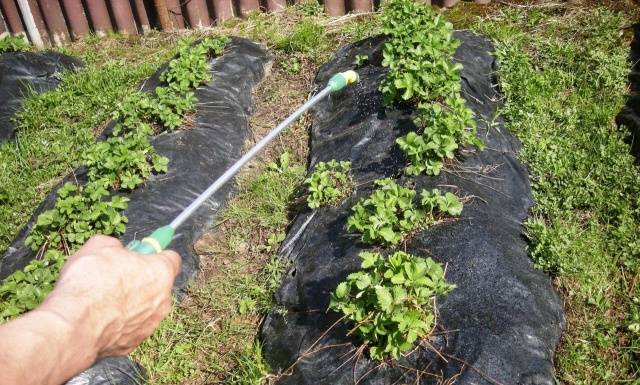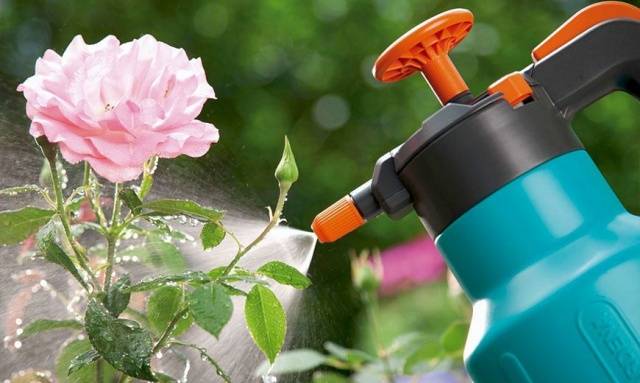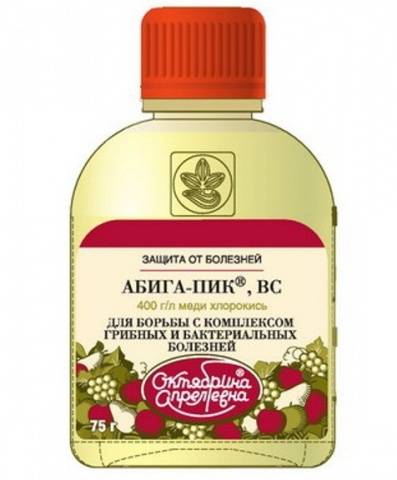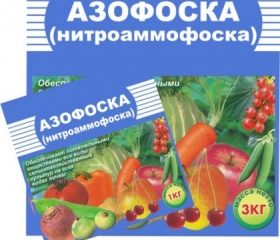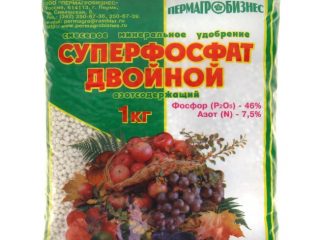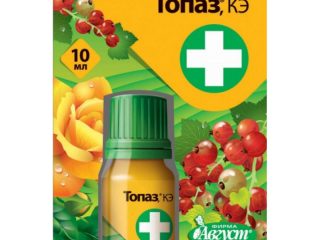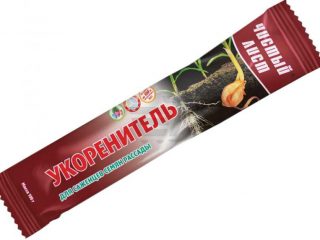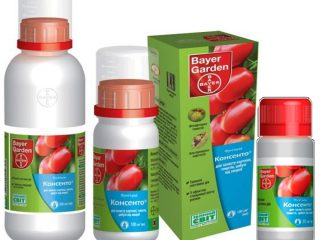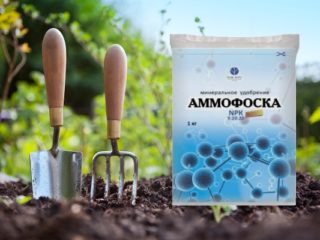Content
Fungal diseases affect fruit trees, garden flowers, berries and vegetables. An effective method of combating lesions is the use of the chemical drug Abiga Peak. The fungicide acts against a wide range of diseases and is safe for the environment if the rules of use are followed.
Features of the fungicide
Abiga Peak is a contact agent that is used to combat fungal diseases. The main component of the drug is copper oxychloride. Its content in the fungicide is 400 g/l.
When the active substance interacts with the fungus, copper is released. As a result, fungal cells are destroyed and sporulation stops. The working solution covers the shoots and leaves, preventing spores from penetrating into plant tissue.
The active substance does not penetrate into the fruits and tubers of plants. The use of the drug does not affect the taste and commercial qualities of the fruit.
Fungicide Abiga Pik belongs to hazard class 3. If the rules of use are followed, the product does not cause harm to people, animals and the environment.
The drug is effective in combating certain diseases:
- late blight;
- cercospora;
- Alternaria blight;
- spotting;
- bacteriosis;
- moniliosis;
- scab;
- mildew;
- oidium, etc.
The drug is available in sealed bottles with a capacity of 1.25 and 50 g. To treat large plantings, it is better to purchase a container that can hold 12.5 kg of the drug.
The shelf life of the fungicide when unopened is 3 years from the date specified by the manufacturer. The working solution is not stored after preparation, so it is important to accurately calculate the dosage.
Advantages
Using the drug Abiga Peak has certain advantages:
- ease of preparation of the solution;
- helps increase chlorophyll in plant cells;
- effective at low air temperatures;
- the solution adheres well to the leaves and provides protection against fungus;
- long storage period;
- compatibility with other fungicides;
- lack of phytotoxicity for plants;
- low degree of danger to insects, birds and animals;
- does not reduce soil fertility.
Flaws
When choosing a fungicide Abiga Pik, take into account the following disadvantages:
- the need to strictly adhere to dosage and precautions;
- not always available for sale;
- poses a danger to fish;
- limited period of validity (10-20 days).
Application procedure
To obtain a working solution, you need to mix the required amount of Abiga Peak with water. Then the resulting solution is poured into a spray bottle.
When working with products containing copper, use only glass, enamel or plastic containers. The plantings are sprayed with the solution using a fine spray.
Vegetables
Fungal diseases affect potatoes, tomatoes, cucumbers, onions and root vegetables.Most often, garden crops suffer from late blight, alternaria, and bacteriosis.
The lesions cover the above-ground parts of plants, slow down their development and reduce productivity. If measures are not taken in a timely manner, the plantings will die.
To obtain a solution according to the instructions for use, take 50 ml of Abiga Peak suspension, which is dissolved in 10 liters of water. Plantings are sprayed when disease symptoms appear.
During the season, 3-4 treatments are carried out. Preventive spraying with the drug is carried out before flowering begins. Treatments are stopped 21 days before harvest.
Fruit trees
Apple and pear trees suffer from scab. This is a fungal disease that appears on the leaves as light green spots. Gradually they grow and become brown in color. The defeat covers flower stalks and leads to a decrease in yield.
Another dangerous disease of fruit trees is fruit rot. The disease affects fruits that show signs of rotting. As a result, crop yields drop significantly.
The fungicide helps cope with other diseases of plum, cherry, apple, apricot and pear:
- clusterosporiosis;
- coccomycosis;
- curliness.
To prevent and treat diseases of fruit trees, prepare a solution consisting of 25 ml of fungicide and 5 liters of water. According to the instructions for the Abiga Peak drug, trees are sprayed with the solution no more than 4 times per season.
Grape
The vineyard is susceptible to a wide range of diseases: oidium, mildew, anthracnose, black spot. The diseases are fungal in nature and spread under high humidity, excessive rainfall, the use of low-quality seedlings, and lack of care.
When alarming symptoms appear, prepare a solution containing 40 ml of fungicide per 10 liters of water.Treatment is carried out by spraying the bushes.
During the season, up to 6 grape treatments are carried out. Copper oxychloride should not be used 3 weeks before harvesting the bunches. According to the instructions for use of the drug Abiga Peak, the minimum interval between procedures is 14 days.
For preventive purposes, grapes are sprayed in early spring when the buds open, before the inflorescences appear, and in the fall after harvesting.
Strawberry
In cold and damp weather, white or brown spots appear on strawberry leaves. Gradually they grow, lead to a decrease in yield, and slow down the development of bushes. These are signs of white and brown spotting.
To combat strawberry diseases prepare a solution containing 50 ml of suspension in a large bucket of water. The plantings are sprayed leaf by leaf so that the solution completely covers the leaf plate.
For preventive treatment with Abiga Peak, according to the instructions, select the period before flowering and after harvesting the berries. When strawberries ripen, it is better to avoid processing.
Deciduous and coniferous trees
Plantings of deciduous and coniferous trees require preventive treatments against rust. The disease affects leaves, needles and cones, which lose color and crumble.
To protect plantings from rust, mix 50 ml of copper oxychloride and 10 liters of water. The trees are sprayed with the resulting solution. To prevent the spread of rust, treatment with the drug is carried out in early spring.
Flowers
Rust and spotting occur on annual and perennial flowers: clematis, chrysanthemums, carnations. Roses are especially susceptible to such diseases. When the fungus spreads, the decorative qualities of the flowers are lost, and the plants themselves develop slowly.
To spray the flower garden, prepare a solution of the Abiga Peak fungicide according to the instructions for use, containing 40 ml of suspension per 10 liters of water. Plants are sprayed twice per season.
Before starting work, remove the affected parts of the plants. After treatment with the drug, indoor flowers are not brought into the house for 24 hours. The door to the balcony is kept closed.
Precautionary measures
Copper oxychloride is used in accordance with the instructions. To protect the respiratory system and mucous membranes, use special equipment: a respirator or mask, long sleeves, gloves.
If the solution gets on your skin, remove the liquid with a cotton swab. The contact area is washed with soap and water. If the solution gets into your eyes, you need to open them wide and rinse with water for 20 minutes.
If you are poisoned by the drug, you need to drink a glass of water and 2 tablets of activated carbon. It is imperative to consult a doctor. Copper compounds are quickly absorbed by the stomach, so in this case you cannot do without medical help.
Fungicide treatment is carried out on a cloudy, windless day or in the evening. During spraying, people without protective equipment and animals should not be within a radius of 150 m.
Reviews from gardeners
Conclusion
Fungicide Abiga Pik is a reliable means for protecting plantings from the spread of fungus. The drug contains a copper compound that destroys fungal cells. To treat plants, a working solution is required. When interacting with copper oxychloride, observe safety precautions and do not allow direct contact with the solution. The product is used to prevent and combat existing diseases.
